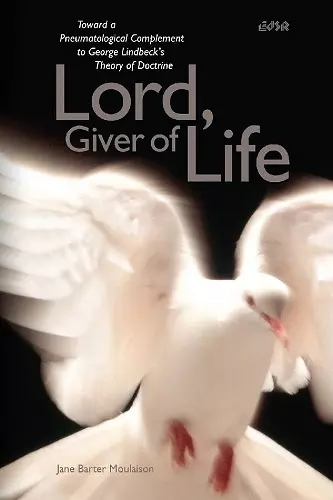Lord, Giver of Life
Toward a Pneumatological Complement to George Lindbeck's Theory of Doctrine
Format:Hardback
Publisher:Wilfrid Laurier University Press
Published:30th Dec '06
Currently unavailable, our supplier has not provided us a restock date

George Lindbeck once characterized postliberalism, which received its initial structure from his book The Nature of Doctrine, as an attempt to recover pre-modern scriptural interpretation in contemporary form. In Lord, Giver of Life: Toward a Pneumatological Complement to George Lindbeck's Theory of Doctrine, Jane Barter Moulaison explores the success of that effort through a close examination of Lindbeck's own theological contributions. Taking seriously the ecumenical promises of Lindbeck's writing (he was instrumental in advancing Lutheran and Roman Catholic dialogue throughout the 1960s, '70s, and '80s), this book brings Lindbeck's famous cultural-linguistic model of religion into dialogue with Christianity's theological forbearers: specifically, the Eastern progenitors of orthodox confession.
This constellation of theological voices - Lindbeck, his supporters and detractors, along with patristic theologians - is meant not only to test the viability of a religious model but, more importantly, to advance Lindbeck's project in ways that have not yet been pursued. Among the critical questions engaged are: to what degree can the excesses of modern theology be overcome by a return to premodern sources? What are the implications of a constructive pneumatology to the cultural-linguistic model? Does this complement address the critiques of postliberalism, particularly those that consider the role of human agency, rationality, and autonomy?
While Lindbeck recovers significant and forgotten elements of pre-modern biblical interpretation, the very formalism of his project sometimes obscures the theological underpinnings of premodern insights and practices. Through specific attention to Eastern Trinitarian theologies of the fourth century, this book exposes a rather persistent oversight within Lindbeck's recovery: namely, that alongside the regulative function of canon and doctrine, early biblical interpretation recognizes the role of the Holy Spirit in the appropriation of scripture, in the mission of the church, and in the defence of the gospel within the context of an unbelieving world. This book attends to these insights from the early churchs doctrine of the Holy Spirit in appreciative service to the cultural-linguistic model of religion.
``Contributes an original perspective to understanding Lindbeck's theology.'' -- Matthew Aaron Tennant, University of Oxford -- Anglican Theological Review, Volume 90, Number 3, 200808
``Professor Jane Barter Moulaison of the University of Winnipeg has written a very fine book on the theological significance of George Lindbeck's contribution to contemporary ecumenical and theological discourse.... Professor Moulaison is to be applauded for her careful exposition, analysis and proposed modifications to Lindbeck's cultural-linguistic model. What makes her constructive work so interesting is its thoroughly theological character. Through sophisticated exegesis of the Eastern trinitarian fathers she reminds contemporary theology of the work peculiar to the person of the Spirit in the divine economy as the One.... This text will be of great interest and value not only to those who are concerned to articulate a doctrine of the church that remains grounded in Christ the Centre and the Spirit whom he sends, but also for those who are concerned with ecumenical dialogue and the formulation of a view of doctrine that will fund a truly ecumenical dogmatics.'' -- Christopher R.J. Holmes, Providence Theological Seminary -- Studies in Religion, 37/1, 2008, 200806
``In this informed and well-written volume of theology, Jane Barter Moulaison succeeds admirably in her purpose of exploring the relationship between the methods of Christian theology and the work of the Holy Spirit. Consistently affirming the triune reality of God, Barter Moulaison deftly treats the methodological controversies within contemporary theology. At the same time, she gives lucid attention to more ancient patterns of theological thought, especially concerning the Holy Spirit. The book as a whole seeks to provide a helpful discussion, in theological terms, about how and why theology functions as it does. It is a broadly ecumenical book, consistent with the approach of the main thinker to whom it is responding--George Lindbeck.... By addressing so many questions effectively, Barter Moulaison invites the reader to think laterally about a broad range of intersecting theological issues. Accordingly, the experience of reading her book is most fruitful, and encourages one to ponder trajectories and core issues beyond what the title might suggest.'' -- Robert C. Fennell -- Touchstone, 26/2, May 2008, 200806
``[A] fine book.... One of this book's main strengths is the ease with which Moulaison employs patristic sources (particularly the Cappadocian Fathers) as the primary source of her constructive proposal and weaves them together with a wide variety of contemporary philosophical and theological sources. This engagement with Cappadocian theology pushes Lindbeck's project in a fruitful and very promising direction.... Moulaison's book is a very attractive and well-needed corrective to Lindbeck's overall project that no student of post-liberal theology ought to miss.'' -- Patrick M. McManus -- University of Toronto Quarterly, Letters in Canada 2006, Volume 77, Number 1, Winter 2008, 200807
ISBN: 9780889205017
Dimensions: 235mm x 157mm x 17mm
Weight: 440g
180 pages